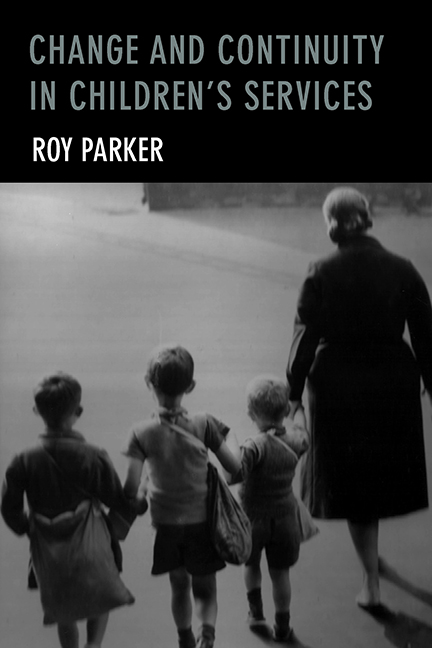Book contents
- Frontmatter
- Dedication
- Cover illustration
- Contents
- Acknowledgements
- Preface
- 1 Introduction: patterns of change and continuity
- 2 Residential child care: an historical perspective
- 3 From boarding-out to foster care
- 4 The evolution of landmark legislation
- 5 Getting started with the Children Act 1948: what do we learn?
- 6 Child care in the melting pot in the 1980s
- 7 Trends, transitions and tensions: children’s services since 101 the 1980s
- 8 Reflections on the assessment of outcomes in child care
- 9 The role and function of inquiries
- 10 Evidence, judgement, values and engagement
- 11 Emerging issues: looking ahead
- Notes and references
- Bibliography
- Index
1 - Introduction: patterns of change and continuity
Published online by Cambridge University Press: 07 March 2022
- Frontmatter
- Dedication
- Cover illustration
- Contents
- Acknowledgements
- Preface
- 1 Introduction: patterns of change and continuity
- 2 Residential child care: an historical perspective
- 3 From boarding-out to foster care
- 4 The evolution of landmark legislation
- 5 Getting started with the Children Act 1948: what do we learn?
- 6 Child care in the melting pot in the 1980s
- 7 Trends, transitions and tensions: children’s services since 101 the 1980s
- 8 Reflections on the assessment of outcomes in child care
- 9 The role and function of inquiries
- 10 Evidence, judgement, values and engagement
- 11 Emerging issues: looking ahead
- Notes and references
- Bibliography
- Index
Summary
This opening chapter sets the scene for what is to follow. It does not offer a detailed introduction but it does identify some of the issues that subsequent chapters address. In that respect it is intended to whet the readers’ appetites, encouraging them to read on. Several themes reappear. There is the importance of appreciating the historical background of current issues. Another is the significance of the political and economic contexts within which children's services have evolved. A third is the need to understand how and why the problems in these services arise, rather than simply describing them and attributing blame or approbation. One further theme is the complicated inter-play of evidence, constraints, values and judgement that makes safeguarding vulnerable children and responding to troubled and troublesome adolescents such a demanding responsibility. However, we begin with an emphasis upon change and continuity.
I Legislation
Major legislation is commonly taken to reflect important shifts in the climate of opinion, in public concern or in realignments within the political system. In the children's field it is also often regarded as evidence of greater enlightenment and of an abandonment of what has been found to be unsatisfactory. This view tends to be strengthened because it is unusual for substantial controversy to arise during the passage of children's bills through Parliament, although particular clauses may be hotly contested. Of course, much will have led to a government's decision to introduce a new measure. Indeed, almost all legislation is the culmination of political processes that have been shaped by many forces, often in combination. They will have included the emergence of new information, new theories, new technology, scandal, shifts in economic conditions and in prevailing beliefs and ideologies, including those within the governing party. Yet in order for them to result in significant legislation they need to be orchestrated and politicised. Sometimes governments will take the initiative; at other times campaigning groups will be driving matters forward.
Against such a background a number of assumptions are liable to be made. One is that major reforming legislation represents a break with the past. However, there are several qualifications to be made. In the first place no children act has been comprehensive.
- Type
- Chapter
- Information
- Change and Continuity in Children's Services , pp. 1 - 18Publisher: Bristol University PressPrint publication year: 2015



